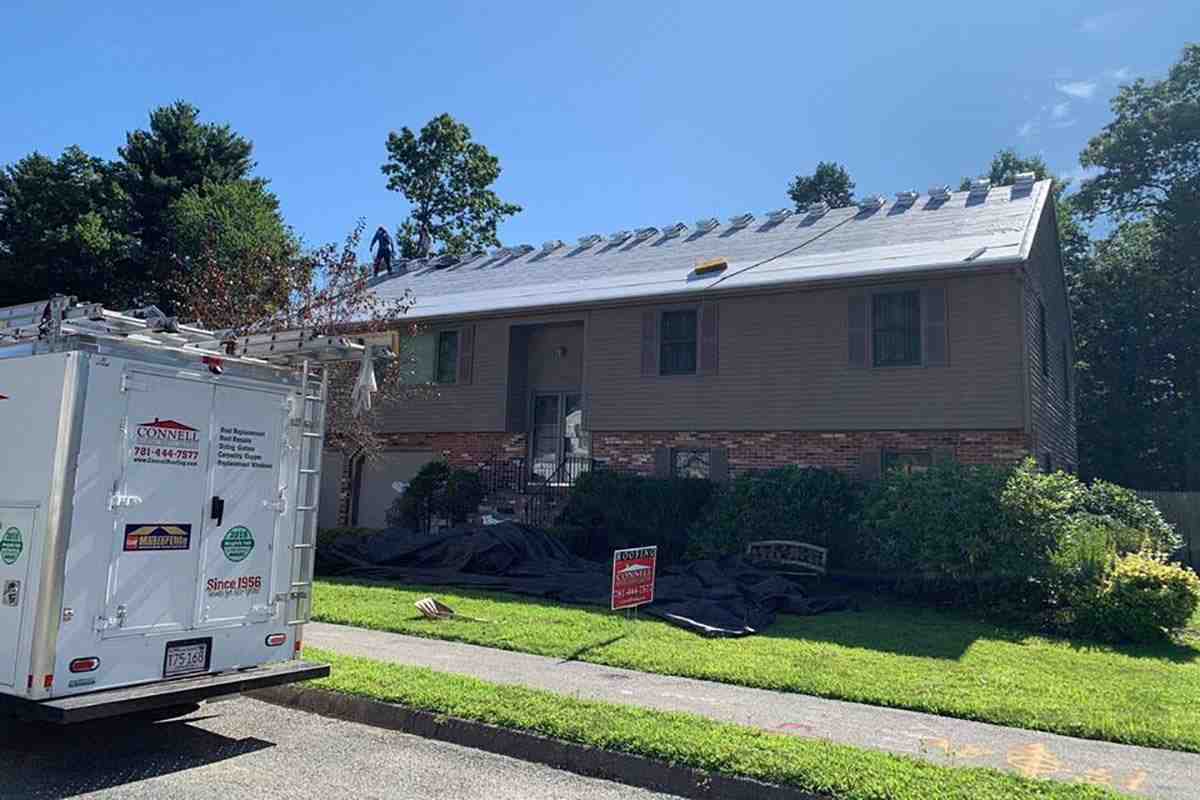Top 5 Essential Tips for Your 2024 Roofing Permit
Introduction
When initiating a roofing project, securing a roofing permit is not just a formality—it’s a critical step to ensure safety, compliance with local building codes, and protection of your investment. Whether you’re patching up a few shingles or doing a full replacement, this document is your first line of defense against potential legal and safety issues.
Roofing permits are vital because they:
– Ensure safety: They confirm that your project meets structural and fire safety standards.
– Protect legally: They keep you compliant with local ordinances and building codes.
– Enhance value: They preserve the value of your home, especially important if you plan to sell.
Getting the permit means that your project will be inspected by professionals, typically from your local city or town’s building department, who guarantee that the roofing work adheres to all the necessary guidelines and standards.
Ensuring that a competent, licensed contractor like Connell Roofing handles the permit process can save you from many potential headaches. A reputable contractor will not only navigate these requirements with ease but also ensure that all aspects of the installation are up to par, sparing you from future complications or liabilities.
Understanding Roofing Permits
When you’re planning a roofing project, understanding the basics of roofing permits is crucial. This section will guide you through Permit Basics, Local Codes, and the Importance of Inspections.
Permit Basics
A roofing permit is a legal document issued by your local building department. It grants permission to start construction or renovation on your roof. This permit ensures that your project plans comply with local safety codes and regulations. The process usually involves submitting detailed project plans and sometimes, the plans must be prepared by a licensed professional.
Local Codes
Local codes are specific rules and regulations that govern construction and building standards in your area. These codes ensure that buildings are safe, healthy, and reliable. They cover everything from structural integrity to energy efficiency. For roofing, local codes could dictate materials to be used, methods of installation, and even the color of your roof depending on your locality. For instance, in areas prone to high winds, like those outlined in Twin Falls County, the building design must withstand specific wind speeds.
Inspection Importance
After obtaining a permit, inspections are crucial. They are typically conducted by city or county officials at several stages of the project. The first inspection might check the condition of the existing roof structure, while subsequent inspections might focus on the new materials and installation methods. The final inspection confirms that the project complies with the code and the permit specifications.
Inspectors ensure that the work done on your roof is safe and meets all the required standards. This is not just about regulatory compliance; it’s about your safety. A poorly installed roof can lead to serious issues like leaks, mold, or even structural damage. Connell Roofing, for example, ensures that all installations are inspected and meet the highest standards of quality and safety, aligning with local building codes.
Understanding these aspects of roofing permits before beginning your project can help streamline the process, ensuring that all work adheres to the necessary guidelines and standards. A valid permit and a series of professional inspections are your best assurances against future roofing problems.
How to Obtain a Roofing Permit
Obtaining a roofing permit is a critical step in ensuring your roofing work is up to code and legally compliant. Here’s a simple guide to help you through the process.
Application Process
First, you need to contact your local building department. Each city or county has its own Building Safety Department, and they handle permit applications. You can usually find their contact information and application forms on the city’s official website.
- Visit the Local Building Department Website: Start by looking up your local building department online to find specific requirements and downloadable forms.
- Gather Information: You’ll need details about your roofing project, including the scope of work and the contractor’s details.
- Submit the Application: Fill out the application form. Some areas might require you to submit plans or additional documentation.
Documents Required
The specific documents required can vary, but generally, you will need:
- A completed permit application form.
- Proof of property ownership.
- Detailed roofing plans (if applicable).
- Contractor’s license and insurance information.
- Site plan showing the location of the home within the property.
Make sure to check with your local office for any additional documents that might be needed.
Online Submission
Many municipalities now offer the convenience of online submissions through platforms like EPIC-LA. This system allows homeowners and contractors to submit permit applications, documents, and even pay fees online. It simplifies the process and can save a lot of time.
- Access the Online Portal: Go to the website provided by your city’s building department.
- Create an Account: You will likely need to register for an account before you can submit applications.
- Upload Documents: Use the portal to upload all necessary documents and fill out the digital application form.
- Pay Fees: Most systems will allow you to pay the required fees directly through the portal.
EPIC-LA
For residents of Los Angeles, EPIC-LA is a streamlined option to manage permit applications. It is designed to handle everything electronically, from application to issuance. If your locality offers a similar system, it’s worth using for its efficiency and convenience.
- Navigate the System: EPIC-LA is user-friendly, guiding you through each step.
- Immediate Updates: Receive updates and notifications directly through the platform.
- Inspection Scheduling: Easily schedule inspections as needed throughout your project.
By following these steps, you can efficiently obtain a roofing permit, ensuring that your roofing project complies with local regulations and is completed without legal issues. Working with a reputable contractor like Connell Roofing can further smooth the process, as they are familiar with local codes and permit requirements. This way, you ensure your roof is not only beautiful but also safe and compliant.
Next, we’ll explore the costs associated with roofing permits to help you budget your project effectively.
Costs Associated with Roofing Permits
When planning a roofing project, understanding the costs involved with obtaining a roofing permit is crucial. These costs can vary significantly depending on several factors including your location, the size of your roof, and the complexity of the project. Here’s what you need to know about the financial aspects of securing a roofing permit.
Permit Fees
The initial expense you’ll encounter when applying for a roofing permit is the permit fee itself. This fee is mandatory and is paid directly to your local building department. For example, in Twin Falls County, the specific criteria and costs can be found by contacting the local Building Department. Generally, these fees can range from a modest $50 to upwards of $500 or more, depending on the jurisdiction and scope of the project.
Additional Costs
Beyond the basic permit fees, there are other potential costs to consider:
- Inspection Fees: Some localities require one or more inspections during the roofing project. These inspections ensure the work complies with local codes. Each inspection can carry its own fee.
- Plan Review Fees: If your roofing project is complex or involves structural changes, your local building department might require a detailed review of the project plans, which can incur additional costs.
Cost Variations by State
Costs can also vary widely by state and even within different municipalities in the same state. For instance:
– In Idaho, companies like PermitFlow streamline the permit application process, but local fees will still apply based on municipal codes.
– In Massachusetts, as discussed by Connell Roofing, the permit process involves several steps including application, review, and approval, each potentially carrying its own costs.
Real-Life Cost Examples
To give you a clearer picture, here are some real-life examples of roofing permit costs:
– In Volusia County, a roofing permit might be listed at $5,800 as part of a larger project cost, reflecting both the scope of work and the administrative fees involved.
– In other areas, such as Boise, Idaho, streamlined services by PermitFlow can help manage these costs more efficiently, though the base fees set by local governments still apply.
By understanding these costs and planning for them in your budget, you can ensure that your roofing project proceeds smoothly without any financial surprises. Next, we’ll tackle some common questions about roofing permits to clear up any confusion and help you get started with your project.
Common Questions About Roofing Permits
Does Idaho require building permits?
Yes, Idaho requires building permits for most construction projects, including roofing. This ensures that all construction meets safety and zoning standards. Cities like Boise, Meridian, and Coeur d’Alene have specific requirements and processes for obtaining these permits. It’s crucial to check with your local building department or use services like PermitFlow for streamlined permit management.
How do I get a roof permit in Florida?
To obtain a roofing permit in Florida, you must apply through your local building department. The process typically involves:
- Submitting a detailed description of the work to be done.
- Providing proof of property ownership.
- Showing proof that your contractor is licensed and insured.
Florida has stringent codes, especially concerning hurricane preparedness, and local building departments are meticulous in ensuring compliance. For instance, in areas like Volusia County, the permit process is crucial for validating that roofing work adheres to state and local safety standards.
How much is a roofing permit in California?
The cost of a roofing permit in California can vary widely depending on the location and scope of the project. Generally, fees are based on the project’s value or a flat rate determined by the local building department. For example, in larger cities like Los Angeles or San Francisco, permit fees can be higher due to additional regulatory requirements and the higher cost of administrative services.
In California, it’s also important to consider that areas with higher seismic activity may have stricter building codes, potentially affecting the complexity and cost of obtaining a roofing permit.
By addressing these common questions, homeowners can better navigate the complexities of obtaining roofing permits and ensure their roofing projects comply with all necessary legal and safety requirements. Next, we’ll explore why these permits are crucial for homeowner safety, compliance, and peace of mind.
Why Roofing Permits Matter
When it comes to roofing, obtaining the necessary permits isn’t just a bureaucratic step; it’s a crucial part of ensuring the safety, legality, and value of your home improvement. Here’s why:
Safety Assurance
A roofing permit ensures that your roofing project adheres to local building codes and safety standards. These codes are designed to protect your home from structural failures and hazards. For example, in areas with high wind speeds, like Twin Falls County where the wind loading standard is 115 mph for residential buildings, the permit process ensures that your roof can withstand such conditions. This not only secures the safety of the occupants but also prevents potential damages associated with extreme weather.
Legal Compliance
Operating within the law is essential, and roofing permits are a big part of that when modifying your home. Installing a roof without a permit can lead to legal troubles including fines and complications when you decide to sell your home. Moreover, as highlighted by National Home Improvement, performing roofing work legally avoids the risks of penalties and having to redo the work to meet inspection standards.
Insurance Implications
Insurance companies often require proof that any major home improvements, like roofing, comply with local codes. If you install a new roof without a permit, your home insurance might not cover damages related to the roof. This can lead to significant financial losses, especially if you face severe weather conditions that test the integrity of your roof.
Market Value
A new roof can significantly increase your home’s market value. However, this increase is contingent on the roof being up to code. Potential homebuyers are likely to investigate whether all renovations and installations have been performed legally with all necessary permits. As noted by experts at Connell Roofing, having a roofing permit can smooth the path to closing a sale, providing clear proof of compliance and workmanship.
By ensuring that your roofing project starts with the appropriate permits, you’re not just complying with local laws—you’re also safeguarding your investment and ensuring the safety of everyone under your roof. Next, we’ll discuss how to choose the right contractor to handle this critical work, emphasizing the importance of credentials, insurance, and the ability to navigate the permit process effectively.
Choosing the Right Contractor
When it comes to roofing, the quality of the contractor you choose can make or break your project. Here’s how to ensure you pick the right one.
Licensed Contractors
Always verify that the contractor is licensed to work in your area. A licensed contractor is not only required to meet specific standards set by local building codes but also tends to be more reliable and knowledgeable. For example, a licensed contractor will be familiar with the roofing permit process and local construction requirements, which can prevent costly and frustrating project delays.
Insurance
Ensure that your contractor carries both liability insurance and worker’s compensation. This protects you in case of accidents or damage to your property during the roofing project. Without proper insurance, you could be financially responsible for any injuries or damages that occur on your property.
Permit Responsibilities
A reputable contractor will handle the roofing permit process for you. They understand the importance of permits in ensuring that the work complies with local building codes and standards. If your contractor suggests you pull the permit yourself, consider it a red flag. This often indicates they may not be licensed in your area, or they are trying to avoid responsibility for the project.
Avoiding Unlicensed Work
Hiring an unlicensed contractor might be tempting, especially if they offer a lower quote. However, this can lead to numerous problems. Unlicensed contractors often do not pull the necessary permits, leaving you liable if the work does not meet local codes. Moreover, any warranties or guarantees they offer could be invalid, leaving you with no recourse if there are issues with the roof after installation.
By choosing a licensed, insured contractor who understands and respects the permit process, you’re not only ensuring that your roofing project is done right but also protecting your home and finances. Connell Roofing exemplifies these qualities, with a strong track record and commitment to upholding high standards in every project they undertake.
Conclusion
At Connell Roofing, we understand that navigating the complexities of roofing permits can be daunting for homeowners. That’s why we are committed to not only guiding you through the process but also ensuring that every aspect of your roofing project meets the highest standards of quality and compliance.
Quality Assurance
We pride ourselves on our meticulous attention to detail and our unwavering commitment to quality. Every roofing project we undertake is executed with precision, using only top-tier materials and techniques that comply with local building codes. Our dedication to quality assurance means that when we complete a roof installation, you can be confident that it’s built to last and adheres to all safety and legal requirements.
Customer Satisfaction
Your satisfaction is our top priority. From the initial consultation to the final inspection, our team provides transparent communication, professional service, and tailored solutions to meet your specific needs. We understand the importance of your home’s integrity and strive to ensure that every customer feels informed and confident throughout the roofing process.
By choosing Connell Roofing, you’re not just hiring a contractor; you’re partnering with a team of experts who are invested in protecting your home and enhancing its value. We guarantee that all necessary roofing permits are obtained and that all installations are performed to exceed industry standards, ensuring peace of mind and satisfaction.
For more information on how we can help with your next roofing project, visit our services page. Let us help you make informed decisions and achieve the best possible outcomes for your roofing needs.
In conclusion, securing the right roofing permit is crucial for the safety, legality, and insurance compliance of your roofing project. Connell Roofing stands ready to ensure that every aspect of your roofing project is handled with the utmost care and professionalism. Trust us to deliver not only a durable roof but also a smooth and compliant roofing experience.



